Dissertation: Smoking Cessation Impact on Mental Health in UK Patients
VerifiedAdded on 2022/08/21
|68
|16982
|22
Report
AI Summary
This dissertation presents a systematic review examining the effects of smoking cessation on mental health and wellbeing in acutely ill patients within mental health settings in the United Kingdom. The review critically analyzes existing evidence-based research, focusing on the psychological and physiological outcomes of smoking cessation interventions. Key findings suggest that smoking cessation can lead to reduced severity of depressive and anxiety symptoms, improvements in dopamine activity, and enhanced self-esteem. Furthermore, the review highlights the beneficial metabolic and cardiovascular outcomes associated with quitting smoking, potentially mitigating the risk of reduced life expectancy and high mortality rates in this patient population. The research emphasizes the need for further, UK-specific, quantitative research to inform and guide mental healthcare organizations on effective smoking cessation interventions and their implications for nursing practice. The review includes a detailed methodology, results from selected articles, a discussion of the findings, limitations, and a conclusion summarizing the impact of smoking cessation on various health aspects and recommending future research directions.
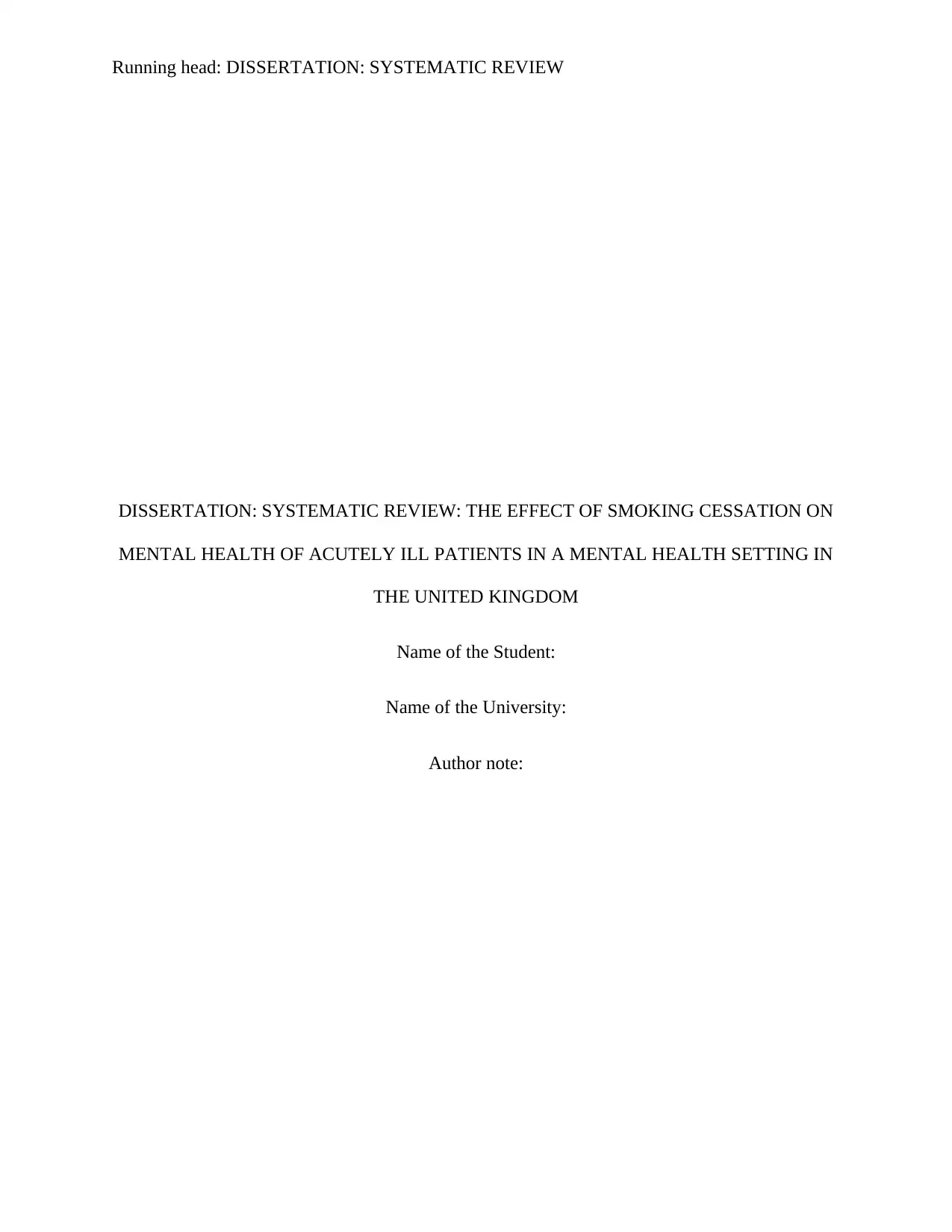
Running head: DISSERTATION: SYSTEMATIC REVIEW
DISSERTATION: SYSTEMATIC REVIEW: THE EFFECT OF SMOKING CESSATION ON
MENTAL HEALTH OF ACUTELY ILL PATIENTS IN A MENTAL HEALTH SETTING IN
THE UNITED KINGDOM
Name of the Student:
Name of the University:
Author note:
DISSERTATION: SYSTEMATIC REVIEW: THE EFFECT OF SMOKING CESSATION ON
MENTAL HEALTH OF ACUTELY ILL PATIENTS IN A MENTAL HEALTH SETTING IN
THE UNITED KINGDOM
Name of the Student:
Name of the University:
Author note:
Paraphrase This Document
Need a fresh take? Get an instant paraphrase of this document with our AI Paraphraser
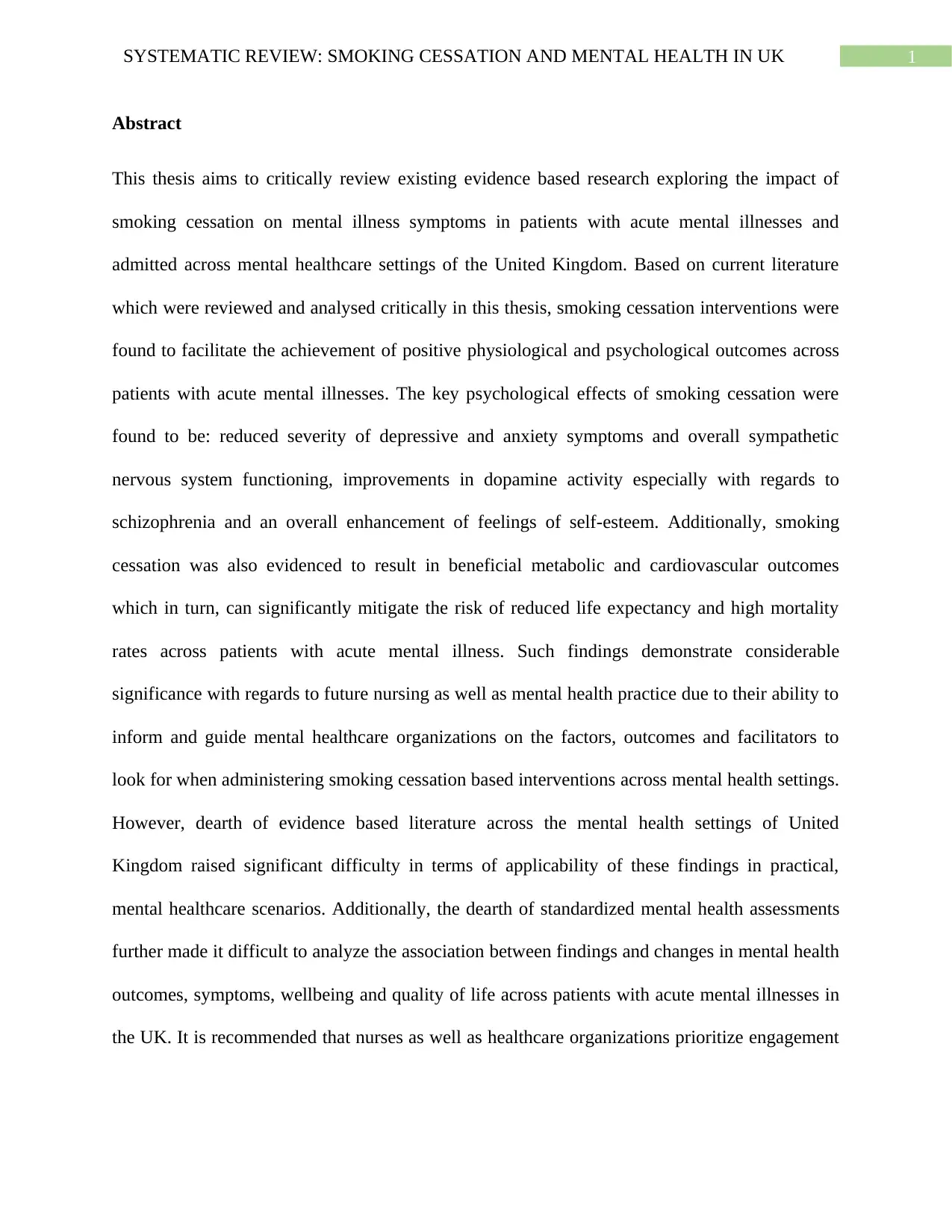
1SYSTEMATIC REVIEW: SMOKING CESSATION AND MENTAL HEALTH IN UK
Abstract
This thesis aims to critically review existing evidence based research exploring the impact of
smoking cessation on mental illness symptoms in patients with acute mental illnesses and
admitted across mental healthcare settings of the United Kingdom. Based on current literature
which were reviewed and analysed critically in this thesis, smoking cessation interventions were
found to facilitate the achievement of positive physiological and psychological outcomes across
patients with acute mental illnesses. The key psychological effects of smoking cessation were
found to be: reduced severity of depressive and anxiety symptoms and overall sympathetic
nervous system functioning, improvements in dopamine activity especially with regards to
schizophrenia and an overall enhancement of feelings of self-esteem. Additionally, smoking
cessation was also evidenced to result in beneficial metabolic and cardiovascular outcomes
which in turn, can significantly mitigate the risk of reduced life expectancy and high mortality
rates across patients with acute mental illness. Such findings demonstrate considerable
significance with regards to future nursing as well as mental health practice due to their ability to
inform and guide mental healthcare organizations on the factors, outcomes and facilitators to
look for when administering smoking cessation based interventions across mental health settings.
However, dearth of evidence based literature across the mental health settings of United
Kingdom raised significant difficulty in terms of applicability of these findings in practical,
mental healthcare scenarios. Additionally, the dearth of standardized mental health assessments
further made it difficult to analyze the association between findings and changes in mental health
outcomes, symptoms, wellbeing and quality of life across patients with acute mental illnesses in
the UK. It is recommended that nurses as well as healthcare organizations prioritize engagement
Abstract
This thesis aims to critically review existing evidence based research exploring the impact of
smoking cessation on mental illness symptoms in patients with acute mental illnesses and
admitted across mental healthcare settings of the United Kingdom. Based on current literature
which were reviewed and analysed critically in this thesis, smoking cessation interventions were
found to facilitate the achievement of positive physiological and psychological outcomes across
patients with acute mental illnesses. The key psychological effects of smoking cessation were
found to be: reduced severity of depressive and anxiety symptoms and overall sympathetic
nervous system functioning, improvements in dopamine activity especially with regards to
schizophrenia and an overall enhancement of feelings of self-esteem. Additionally, smoking
cessation was also evidenced to result in beneficial metabolic and cardiovascular outcomes
which in turn, can significantly mitigate the risk of reduced life expectancy and high mortality
rates across patients with acute mental illness. Such findings demonstrate considerable
significance with regards to future nursing as well as mental health practice due to their ability to
inform and guide mental healthcare organizations on the factors, outcomes and facilitators to
look for when administering smoking cessation based interventions across mental health settings.
However, dearth of evidence based literature across the mental health settings of United
Kingdom raised significant difficulty in terms of applicability of these findings in practical,
mental healthcare scenarios. Additionally, the dearth of standardized mental health assessments
further made it difficult to analyze the association between findings and changes in mental health
outcomes, symptoms, wellbeing and quality of life across patients with acute mental illnesses in
the UK. It is recommended that nurses as well as healthcare organizations prioritize engagement

2SYSTEMATIC REVIEW: SMOKING CESSATION AND MENTAL HEALTH IN UK
in more comprehensive, robust and quantitative research specific to UK settings so as to acquired
clinical findings relevance to the management of acutely ill mental health patients.
in more comprehensive, robust and quantitative research specific to UK settings so as to acquired
clinical findings relevance to the management of acutely ill mental health patients.
⊘ This is a preview!⊘
Do you want full access?
Subscribe today to unlock all pages.

Trusted by 1+ million students worldwide
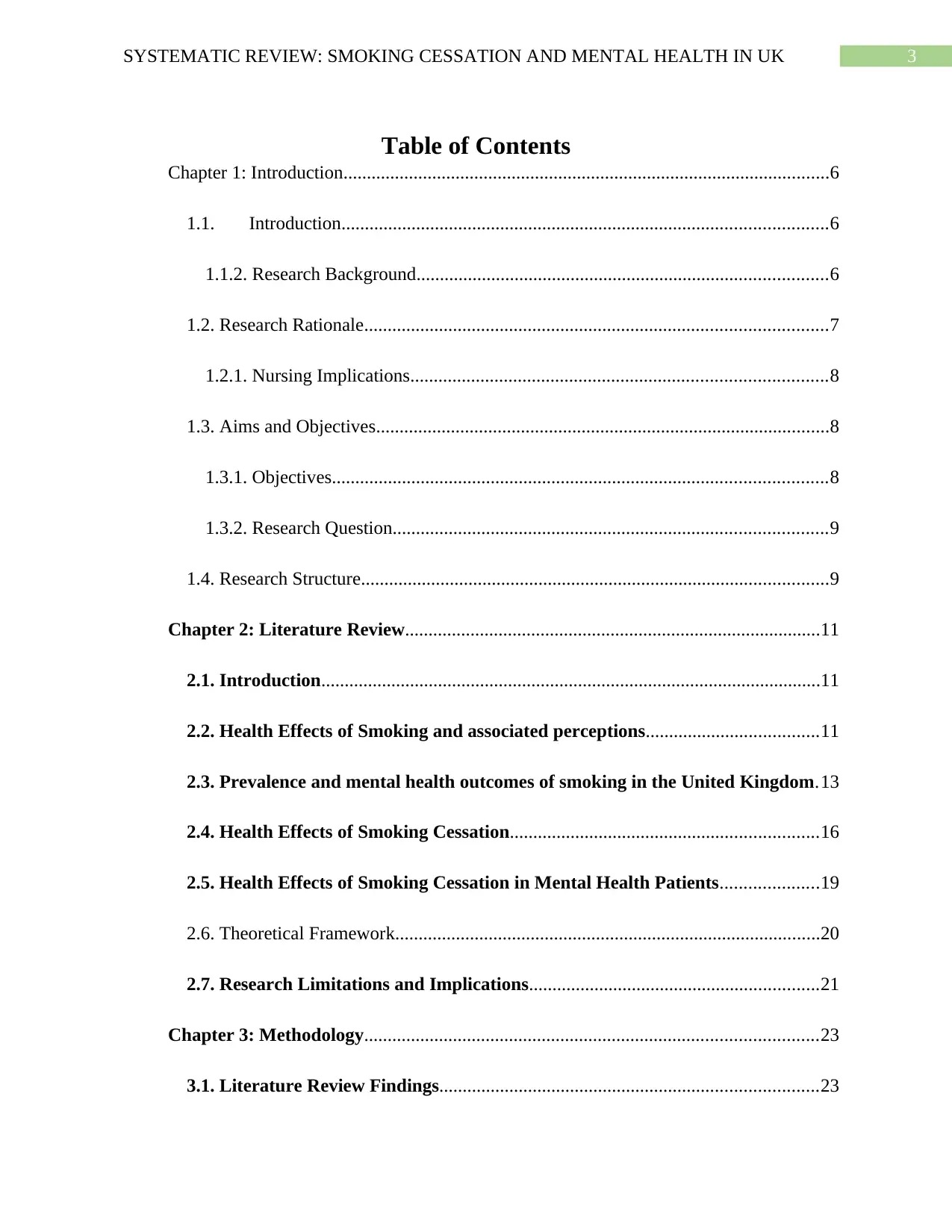
3SYSTEMATIC REVIEW: SMOKING CESSATION AND MENTAL HEALTH IN UK
Table of Contents
Chapter 1: Introduction........................................................................................................6
1.1. Introduction........................................................................................................6
1.1.2. Research Background........................................................................................6
1.2. Research Rationale...................................................................................................7
1.2.1. Nursing Implications.........................................................................................8
1.3. Aims and Objectives.................................................................................................8
1.3.1. Objectives..........................................................................................................8
1.3.2. Research Question.............................................................................................9
1.4. Research Structure....................................................................................................9
Chapter 2: Literature Review.........................................................................................11
2.1. Introduction...........................................................................................................11
2.2. Health Effects of Smoking and associated perceptions.....................................11
2.3. Prevalence and mental health outcomes of smoking in the United Kingdom.13
2.4. Health Effects of Smoking Cessation..................................................................16
2.5. Health Effects of Smoking Cessation in Mental Health Patients.....................19
2.6. Theoretical Framework...........................................................................................20
2.7. Research Limitations and Implications..............................................................21
Chapter 3: Methodology.................................................................................................23
3.1. Literature Review Findings.................................................................................23
Table of Contents
Chapter 1: Introduction........................................................................................................6
1.1. Introduction........................................................................................................6
1.1.2. Research Background........................................................................................6
1.2. Research Rationale...................................................................................................7
1.2.1. Nursing Implications.........................................................................................8
1.3. Aims and Objectives.................................................................................................8
1.3.1. Objectives..........................................................................................................8
1.3.2. Research Question.............................................................................................9
1.4. Research Structure....................................................................................................9
Chapter 2: Literature Review.........................................................................................11
2.1. Introduction...........................................................................................................11
2.2. Health Effects of Smoking and associated perceptions.....................................11
2.3. Prevalence and mental health outcomes of smoking in the United Kingdom.13
2.4. Health Effects of Smoking Cessation..................................................................16
2.5. Health Effects of Smoking Cessation in Mental Health Patients.....................19
2.6. Theoretical Framework...........................................................................................20
2.7. Research Limitations and Implications..............................................................21
Chapter 3: Methodology.................................................................................................23
3.1. Literature Review Findings.................................................................................23
Paraphrase This Document
Need a fresh take? Get an instant paraphrase of this document with our AI Paraphraser
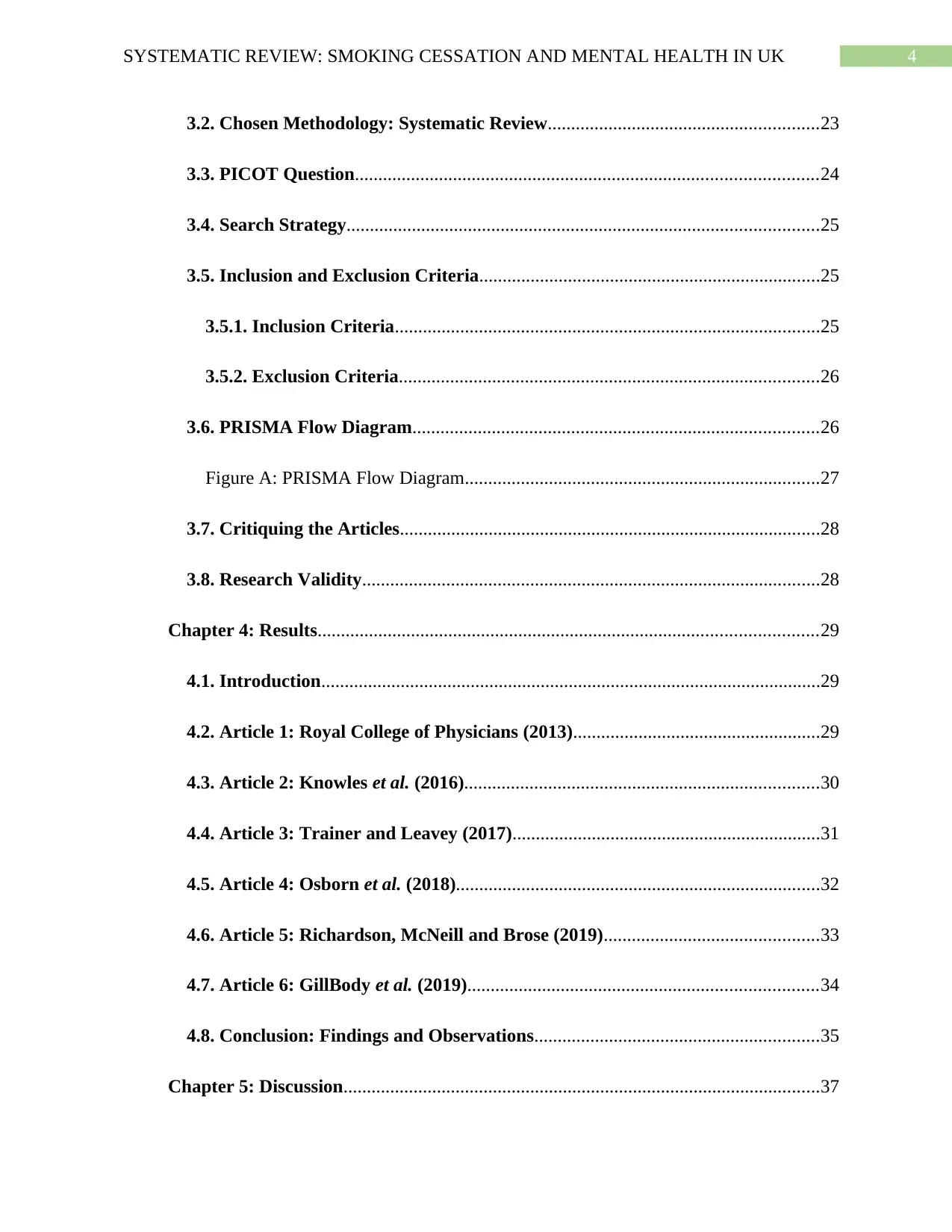
4SYSTEMATIC REVIEW: SMOKING CESSATION AND MENTAL HEALTH IN UK
3.2. Chosen Methodology: Systematic Review..........................................................23
3.3. PICOT Question...................................................................................................24
3.4. Search Strategy.....................................................................................................25
3.5. Inclusion and Exclusion Criteria.........................................................................25
3.5.1. Inclusion Criteria...........................................................................................25
3.5.2. Exclusion Criteria..........................................................................................26
3.6. PRISMA Flow Diagram.......................................................................................26
Figure A: PRISMA Flow Diagram............................................................................27
3.7. Critiquing the Articles..........................................................................................28
3.8. Research Validity..................................................................................................28
Chapter 4: Results...........................................................................................................29
4.1. Introduction...........................................................................................................29
4.2. Article 1: Royal College of Physicians (2013).....................................................29
4.3. Article 2: Knowles et al. (2016)............................................................................30
4.4. Article 3: Trainer and Leavey (2017)..................................................................31
4.5. Article 4: Osborn et al. (2018)..............................................................................32
4.6. Article 5: Richardson, McNeill and Brose (2019)..............................................33
4.7. Article 6: GillBody et al. (2019)...........................................................................34
4.8. Conclusion: Findings and Observations.............................................................35
Chapter 5: Discussion......................................................................................................37
3.2. Chosen Methodology: Systematic Review..........................................................23
3.3. PICOT Question...................................................................................................24
3.4. Search Strategy.....................................................................................................25
3.5. Inclusion and Exclusion Criteria.........................................................................25
3.5.1. Inclusion Criteria...........................................................................................25
3.5.2. Exclusion Criteria..........................................................................................26
3.6. PRISMA Flow Diagram.......................................................................................26
Figure A: PRISMA Flow Diagram............................................................................27
3.7. Critiquing the Articles..........................................................................................28
3.8. Research Validity..................................................................................................28
Chapter 4: Results...........................................................................................................29
4.1. Introduction...........................................................................................................29
4.2. Article 1: Royal College of Physicians (2013).....................................................29
4.3. Article 2: Knowles et al. (2016)............................................................................30
4.4. Article 3: Trainer and Leavey (2017)..................................................................31
4.5. Article 4: Osborn et al. (2018)..............................................................................32
4.6. Article 5: Richardson, McNeill and Brose (2019)..............................................33
4.7. Article 6: GillBody et al. (2019)...........................................................................34
4.8. Conclusion: Findings and Observations.............................................................35
Chapter 5: Discussion......................................................................................................37
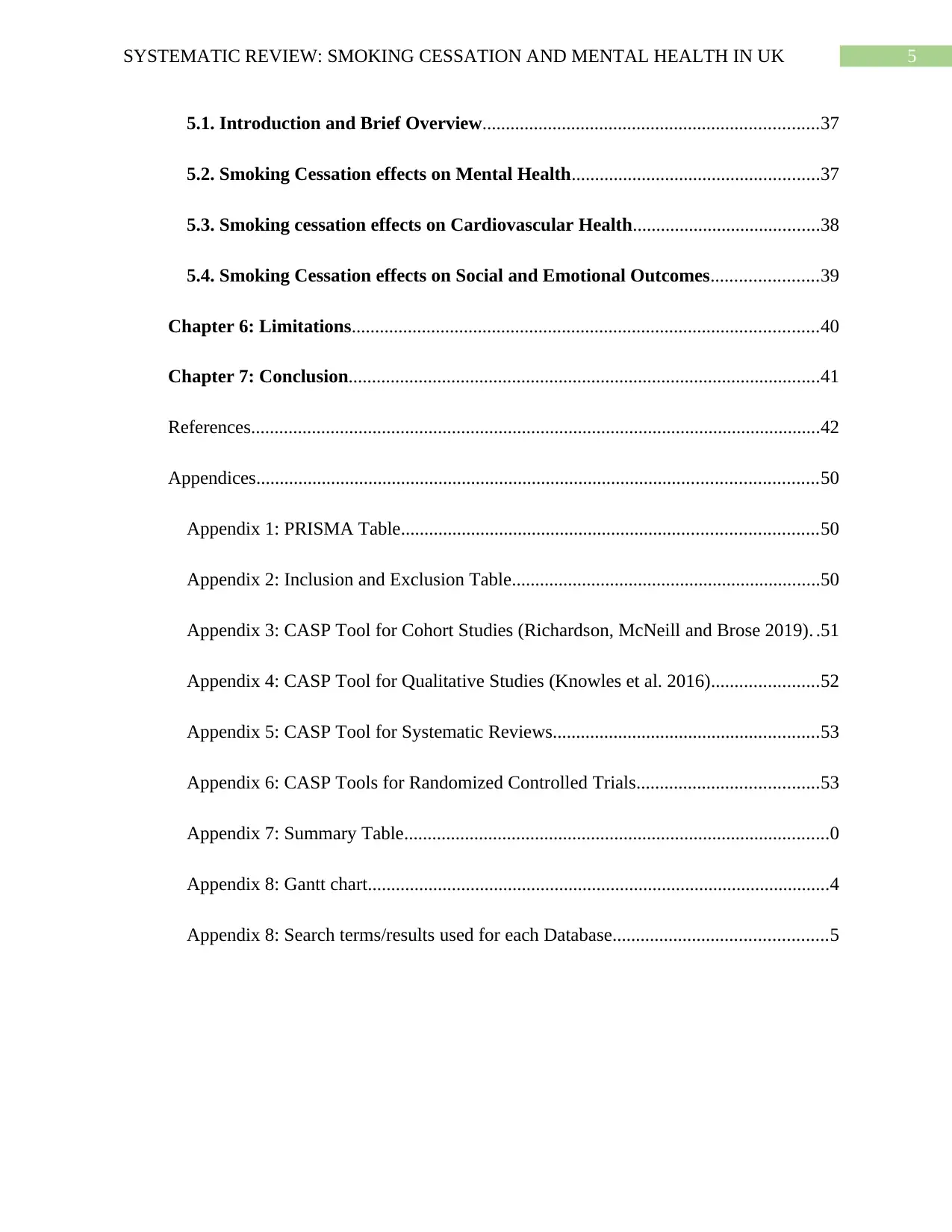
5SYSTEMATIC REVIEW: SMOKING CESSATION AND MENTAL HEALTH IN UK
5.1. Introduction and Brief Overview........................................................................37
5.2. Smoking Cessation effects on Mental Health.....................................................37
5.3. Smoking cessation effects on Cardiovascular Health........................................38
5.4. Smoking Cessation effects on Social and Emotional Outcomes.......................39
Chapter 6: Limitations....................................................................................................40
Chapter 7: Conclusion.....................................................................................................41
References..........................................................................................................................42
Appendices........................................................................................................................50
Appendix 1: PRISMA Table.........................................................................................50
Appendix 2: Inclusion and Exclusion Table..................................................................50
Appendix 3: CASP Tool for Cohort Studies (Richardson, McNeill and Brose 2019). .51
Appendix 4: CASP Tool for Qualitative Studies (Knowles et al. 2016).......................52
Appendix 5: CASP Tool for Systematic Reviews.........................................................53
Appendix 6: CASP Tools for Randomized Controlled Trials.......................................53
Appendix 7: Summary Table...........................................................................................0
Appendix 8: Gantt chart...................................................................................................4
Appendix 8: Search terms/results used for each Database..............................................5
5.1. Introduction and Brief Overview........................................................................37
5.2. Smoking Cessation effects on Mental Health.....................................................37
5.3. Smoking cessation effects on Cardiovascular Health........................................38
5.4. Smoking Cessation effects on Social and Emotional Outcomes.......................39
Chapter 6: Limitations....................................................................................................40
Chapter 7: Conclusion.....................................................................................................41
References..........................................................................................................................42
Appendices........................................................................................................................50
Appendix 1: PRISMA Table.........................................................................................50
Appendix 2: Inclusion and Exclusion Table..................................................................50
Appendix 3: CASP Tool for Cohort Studies (Richardson, McNeill and Brose 2019). .51
Appendix 4: CASP Tool for Qualitative Studies (Knowles et al. 2016).......................52
Appendix 5: CASP Tool for Systematic Reviews.........................................................53
Appendix 6: CASP Tools for Randomized Controlled Trials.......................................53
Appendix 7: Summary Table...........................................................................................0
Appendix 8: Gantt chart...................................................................................................4
Appendix 8: Search terms/results used for each Database..............................................5
⊘ This is a preview!⊘
Do you want full access?
Subscribe today to unlock all pages.

Trusted by 1+ million students worldwide
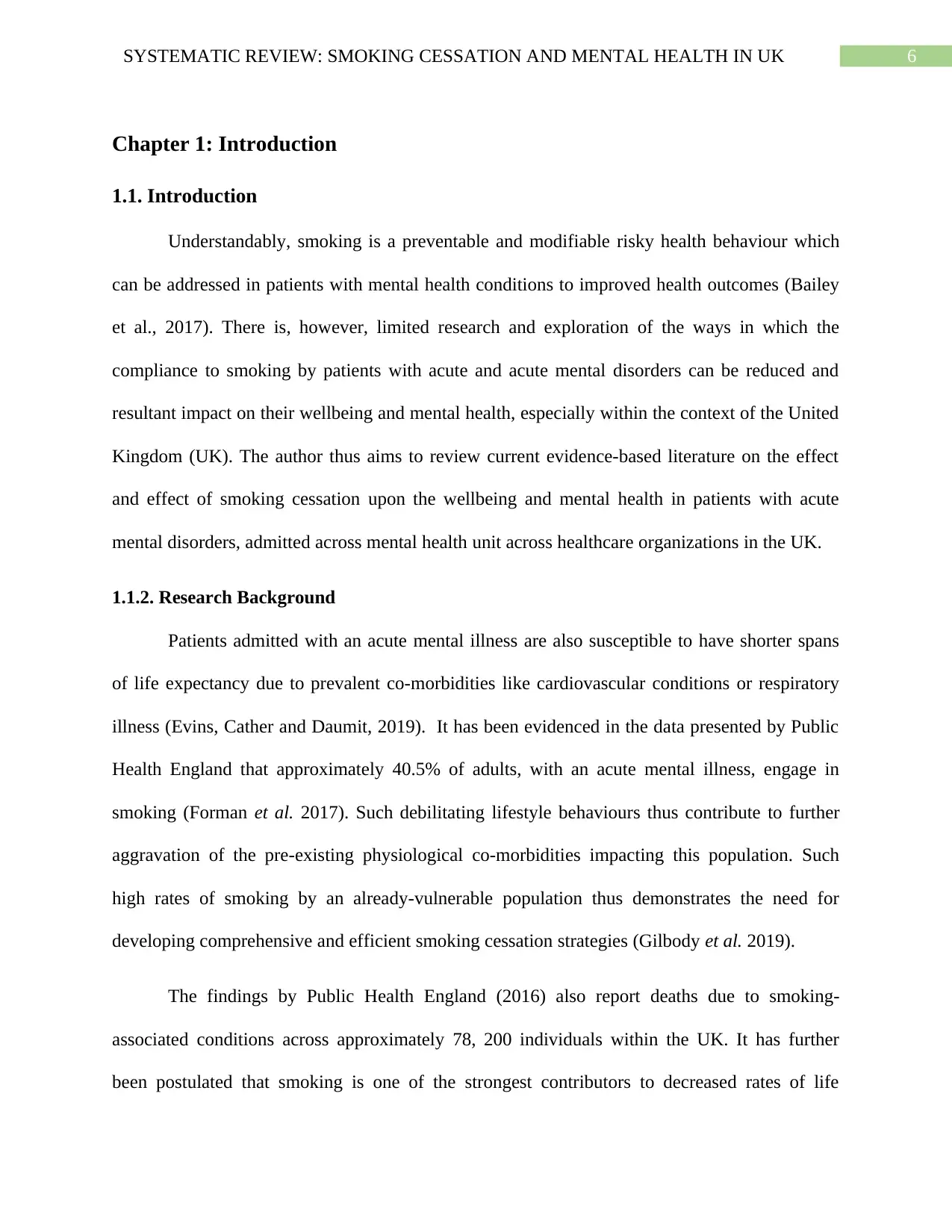
6SYSTEMATIC REVIEW: SMOKING CESSATION AND MENTAL HEALTH IN UK
Chapter 1: Introduction
1.1. Introduction
Understandably, smoking is a preventable and modifiable risky health behaviour which
can be addressed in patients with mental health conditions to improved health outcomes (Bailey
et al., 2017). There is, however, limited research and exploration of the ways in which the
compliance to smoking by patients with acute and acute mental disorders can be reduced and
resultant impact on their wellbeing and mental health, especially within the context of the United
Kingdom (UK). The author thus aims to review current evidence-based literature on the effect
and effect of smoking cessation upon the wellbeing and mental health in patients with acute
mental disorders, admitted across mental health unit across healthcare organizations in the UK.
1.1.2. Research Background
Patients admitted with an acute mental illness are also susceptible to have shorter spans
of life expectancy due to prevalent co-morbidities like cardiovascular conditions or respiratory
illness (Evins, Cather and Daumit, 2019). It has been evidenced in the data presented by Public
Health England that approximately 40.5% of adults, with an acute mental illness, engage in
smoking (Forman et al. 2017). Such debilitating lifestyle behaviours thus contribute to further
aggravation of the pre-existing physiological co-morbidities impacting this population. Such
high rates of smoking by an already-vulnerable population thus demonstrates the need for
developing comprehensive and efficient smoking cessation strategies (Gilbody et al. 2019).
The findings by Public Health England (2016) also report deaths due to smoking-
associated conditions across approximately 78, 200 individuals within the UK. It has further
been postulated that smoking is one of the strongest contributors to decreased rates of life
Chapter 1: Introduction
1.1. Introduction
Understandably, smoking is a preventable and modifiable risky health behaviour which
can be addressed in patients with mental health conditions to improved health outcomes (Bailey
et al., 2017). There is, however, limited research and exploration of the ways in which the
compliance to smoking by patients with acute and acute mental disorders can be reduced and
resultant impact on their wellbeing and mental health, especially within the context of the United
Kingdom (UK). The author thus aims to review current evidence-based literature on the effect
and effect of smoking cessation upon the wellbeing and mental health in patients with acute
mental disorders, admitted across mental health unit across healthcare organizations in the UK.
1.1.2. Research Background
Patients admitted with an acute mental illness are also susceptible to have shorter spans
of life expectancy due to prevalent co-morbidities like cardiovascular conditions or respiratory
illness (Evins, Cather and Daumit, 2019). It has been evidenced in the data presented by Public
Health England that approximately 40.5% of adults, with an acute mental illness, engage in
smoking (Forman et al. 2017). Such debilitating lifestyle behaviours thus contribute to further
aggravation of the pre-existing physiological co-morbidities impacting this population. Such
high rates of smoking by an already-vulnerable population thus demonstrates the need for
developing comprehensive and efficient smoking cessation strategies (Gilbody et al. 2019).
The findings by Public Health England (2016) also report deaths due to smoking-
associated conditions across approximately 78, 200 individuals within the UK. It has further
been postulated that smoking is one of the strongest contributors to decreased rates of life
Paraphrase This Document
Need a fresh take? Get an instant paraphrase of this document with our AI Paraphraser
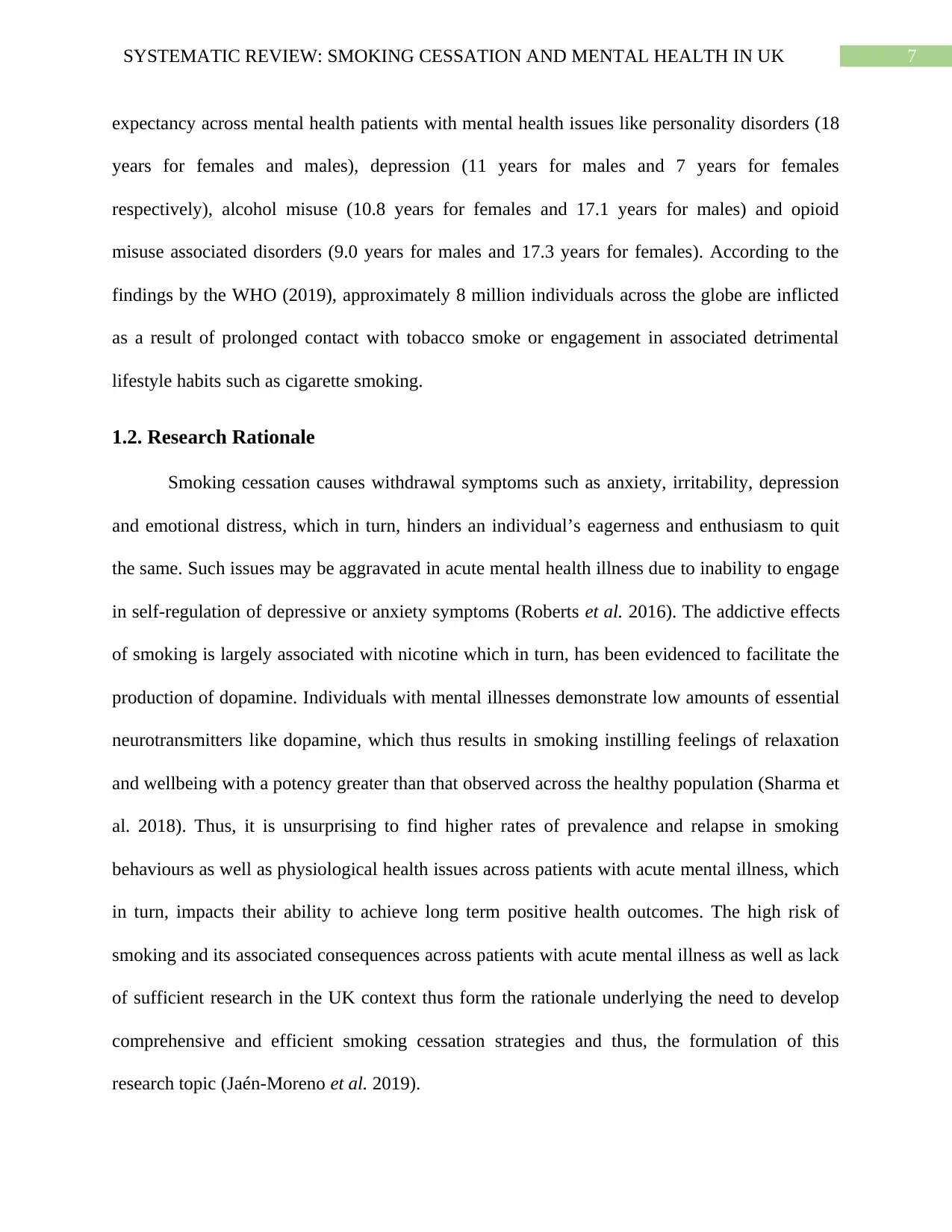
7SYSTEMATIC REVIEW: SMOKING CESSATION AND MENTAL HEALTH IN UK
expectancy across mental health patients with mental health issues like personality disorders (18
years for females and males), depression (11 years for males and 7 years for females
respectively), alcohol misuse (10.8 years for females and 17.1 years for males) and opioid
misuse associated disorders (9.0 years for males and 17.3 years for females). According to the
findings by the WHO (2019), approximately 8 million individuals across the globe are inflicted
as a result of prolonged contact with tobacco smoke or engagement in associated detrimental
lifestyle habits such as cigarette smoking.
1.2. Research Rationale
Smoking cessation causes withdrawal symptoms such as anxiety, irritability, depression
and emotional distress, which in turn, hinders an individual’s eagerness and enthusiasm to quit
the same. Such issues may be aggravated in acute mental health illness due to inability to engage
in self-regulation of depressive or anxiety symptoms (Roberts et al. 2016). The addictive effects
of smoking is largely associated with nicotine which in turn, has been evidenced to facilitate the
production of dopamine. Individuals with mental illnesses demonstrate low amounts of essential
neurotransmitters like dopamine, which thus results in smoking instilling feelings of relaxation
and wellbeing with a potency greater than that observed across the healthy population (Sharma et
al. 2018). Thus, it is unsurprising to find higher rates of prevalence and relapse in smoking
behaviours as well as physiological health issues across patients with acute mental illness, which
in turn, impacts their ability to achieve long term positive health outcomes. The high risk of
smoking and its associated consequences across patients with acute mental illness as well as lack
of sufficient research in the UK context thus form the rationale underlying the need to develop
comprehensive and efficient smoking cessation strategies and thus, the formulation of this
research topic (Jaén-Moreno et al. 2019).
expectancy across mental health patients with mental health issues like personality disorders (18
years for females and males), depression (11 years for males and 7 years for females
respectively), alcohol misuse (10.8 years for females and 17.1 years for males) and opioid
misuse associated disorders (9.0 years for males and 17.3 years for females). According to the
findings by the WHO (2019), approximately 8 million individuals across the globe are inflicted
as a result of prolonged contact with tobacco smoke or engagement in associated detrimental
lifestyle habits such as cigarette smoking.
1.2. Research Rationale
Smoking cessation causes withdrawal symptoms such as anxiety, irritability, depression
and emotional distress, which in turn, hinders an individual’s eagerness and enthusiasm to quit
the same. Such issues may be aggravated in acute mental health illness due to inability to engage
in self-regulation of depressive or anxiety symptoms (Roberts et al. 2016). The addictive effects
of smoking is largely associated with nicotine which in turn, has been evidenced to facilitate the
production of dopamine. Individuals with mental illnesses demonstrate low amounts of essential
neurotransmitters like dopamine, which thus results in smoking instilling feelings of relaxation
and wellbeing with a potency greater than that observed across the healthy population (Sharma et
al. 2018). Thus, it is unsurprising to find higher rates of prevalence and relapse in smoking
behaviours as well as physiological health issues across patients with acute mental illness, which
in turn, impacts their ability to achieve long term positive health outcomes. The high risk of
smoking and its associated consequences across patients with acute mental illness as well as lack
of sufficient research in the UK context thus form the rationale underlying the need to develop
comprehensive and efficient smoking cessation strategies and thus, the formulation of this
research topic (Jaén-Moreno et al. 2019).
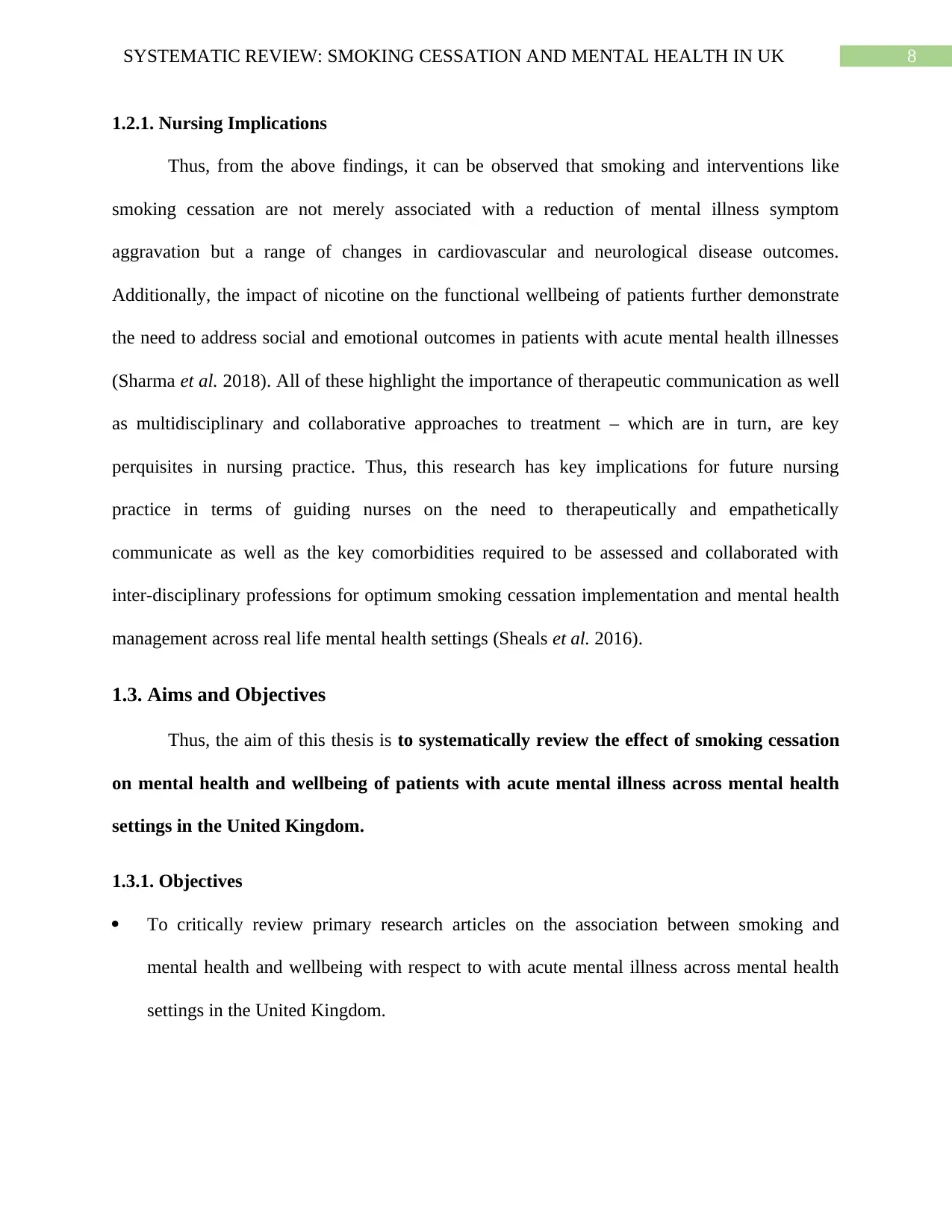
8SYSTEMATIC REVIEW: SMOKING CESSATION AND MENTAL HEALTH IN UK
1.2.1. Nursing Implications
Thus, from the above findings, it can be observed that smoking and interventions like
smoking cessation are not merely associated with a reduction of mental illness symptom
aggravation but a range of changes in cardiovascular and neurological disease outcomes.
Additionally, the impact of nicotine on the functional wellbeing of patients further demonstrate
the need to address social and emotional outcomes in patients with acute mental health illnesses
(Sharma et al. 2018). All of these highlight the importance of therapeutic communication as well
as multidisciplinary and collaborative approaches to treatment – which are in turn, are key
perquisites in nursing practice. Thus, this research has key implications for future nursing
practice in terms of guiding nurses on the need to therapeutically and empathetically
communicate as well as the key comorbidities required to be assessed and collaborated with
inter-disciplinary professions for optimum smoking cessation implementation and mental health
management across real life mental health settings (Sheals et al. 2016).
1.3. Aims and Objectives
Thus, the aim of this thesis is to systematically review the effect of smoking cessation
on mental health and wellbeing of patients with acute mental illness across mental health
settings in the United Kingdom.
1.3.1. Objectives
To critically review primary research articles on the association between smoking and
mental health and wellbeing with respect to with acute mental illness across mental health
settings in the United Kingdom.
1.2.1. Nursing Implications
Thus, from the above findings, it can be observed that smoking and interventions like
smoking cessation are not merely associated with a reduction of mental illness symptom
aggravation but a range of changes in cardiovascular and neurological disease outcomes.
Additionally, the impact of nicotine on the functional wellbeing of patients further demonstrate
the need to address social and emotional outcomes in patients with acute mental health illnesses
(Sharma et al. 2018). All of these highlight the importance of therapeutic communication as well
as multidisciplinary and collaborative approaches to treatment – which are in turn, are key
perquisites in nursing practice. Thus, this research has key implications for future nursing
practice in terms of guiding nurses on the need to therapeutically and empathetically
communicate as well as the key comorbidities required to be assessed and collaborated with
inter-disciplinary professions for optimum smoking cessation implementation and mental health
management across real life mental health settings (Sheals et al. 2016).
1.3. Aims and Objectives
Thus, the aim of this thesis is to systematically review the effect of smoking cessation
on mental health and wellbeing of patients with acute mental illness across mental health
settings in the United Kingdom.
1.3.1. Objectives
To critically review primary research articles on the association between smoking and
mental health and wellbeing with respect to with acute mental illness across mental health
settings in the United Kingdom.
⊘ This is a preview!⊘
Do you want full access?
Subscribe today to unlock all pages.

Trusted by 1+ million students worldwide
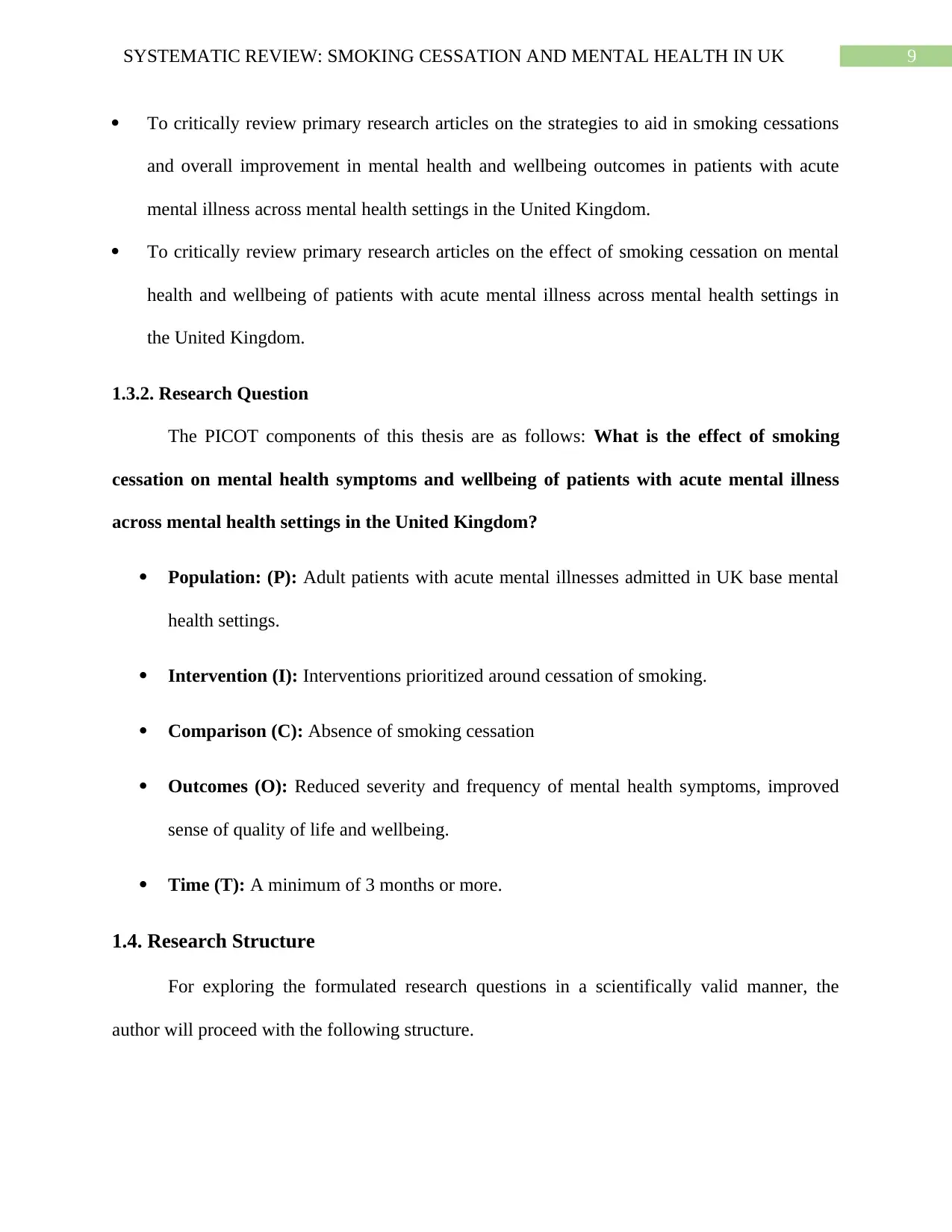
9SYSTEMATIC REVIEW: SMOKING CESSATION AND MENTAL HEALTH IN UK
To critically review primary research articles on the strategies to aid in smoking cessations
and overall improvement in mental health and wellbeing outcomes in patients with acute
mental illness across mental health settings in the United Kingdom.
To critically review primary research articles on the effect of smoking cessation on mental
health and wellbeing of patients with acute mental illness across mental health settings in
the United Kingdom.
1.3.2. Research Question
The PICOT components of this thesis are as follows: What is the effect of smoking
cessation on mental health symptoms and wellbeing of patients with acute mental illness
across mental health settings in the United Kingdom?
Population: (P): Adult patients with acute mental illnesses admitted in UK base mental
health settings.
Intervention (I): Interventions prioritized around cessation of smoking.
Comparison (C): Absence of smoking cessation
Outcomes (O): Reduced severity and frequency of mental health symptoms, improved
sense of quality of life and wellbeing.
Time (T): A minimum of 3 months or more.
1.4. Research Structure
For exploring the formulated research questions in a scientifically valid manner, the
author will proceed with the following structure.
To critically review primary research articles on the strategies to aid in smoking cessations
and overall improvement in mental health and wellbeing outcomes in patients with acute
mental illness across mental health settings in the United Kingdom.
To critically review primary research articles on the effect of smoking cessation on mental
health and wellbeing of patients with acute mental illness across mental health settings in
the United Kingdom.
1.3.2. Research Question
The PICOT components of this thesis are as follows: What is the effect of smoking
cessation on mental health symptoms and wellbeing of patients with acute mental illness
across mental health settings in the United Kingdom?
Population: (P): Adult patients with acute mental illnesses admitted in UK base mental
health settings.
Intervention (I): Interventions prioritized around cessation of smoking.
Comparison (C): Absence of smoking cessation
Outcomes (O): Reduced severity and frequency of mental health symptoms, improved
sense of quality of life and wellbeing.
Time (T): A minimum of 3 months or more.
1.4. Research Structure
For exploring the formulated research questions in a scientifically valid manner, the
author will proceed with the following structure.
Paraphrase This Document
Need a fresh take? Get an instant paraphrase of this document with our AI Paraphraser
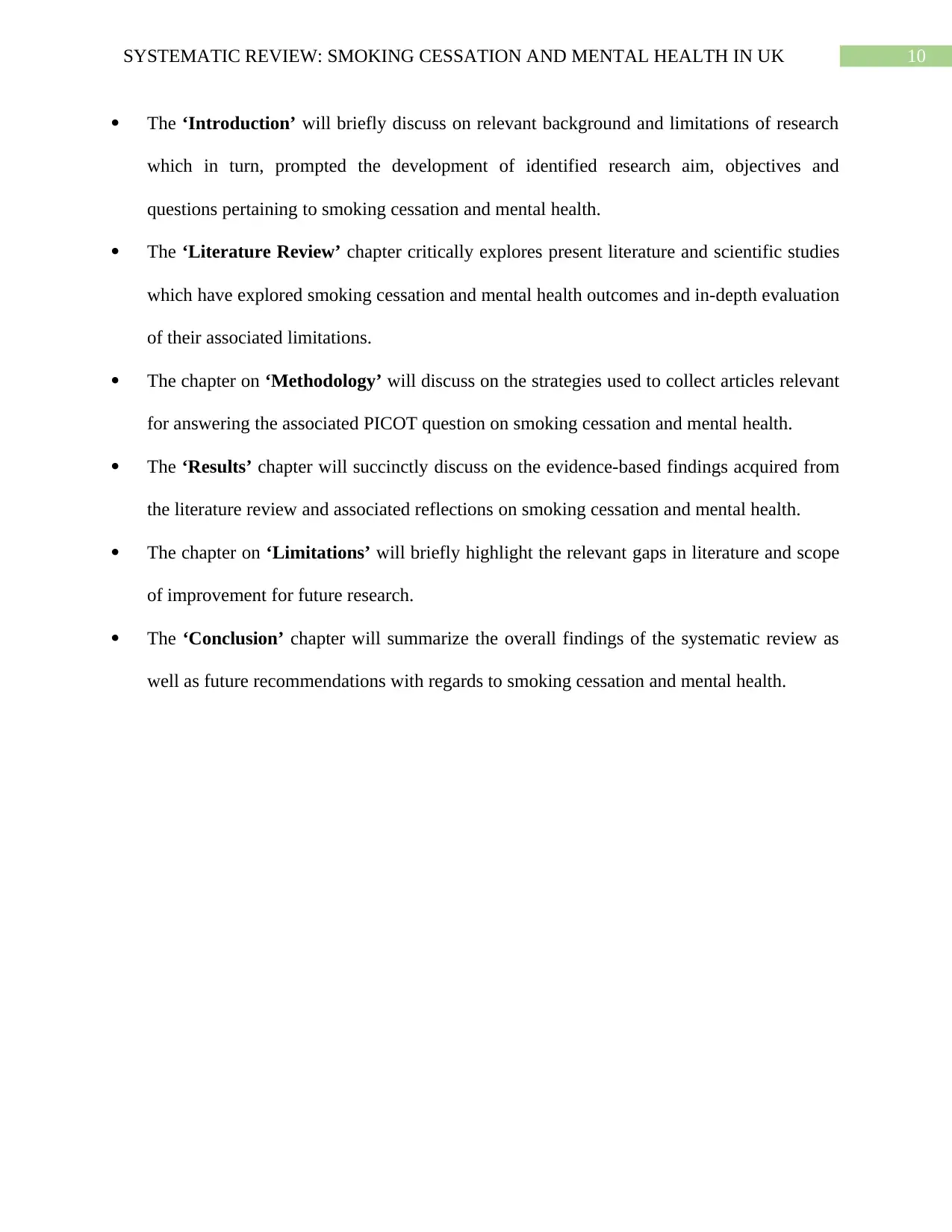
10SYSTEMATIC REVIEW: SMOKING CESSATION AND MENTAL HEALTH IN UK
The ‘Introduction’ will briefly discuss on relevant background and limitations of research
which in turn, prompted the development of identified research aim, objectives and
questions pertaining to smoking cessation and mental health.
The ‘Literature Review’ chapter critically explores present literature and scientific studies
which have explored smoking cessation and mental health outcomes and in-depth evaluation
of their associated limitations.
The chapter on ‘Methodology’ will discuss on the strategies used to collect articles relevant
for answering the associated PICOT question on smoking cessation and mental health.
The ‘Results’ chapter will succinctly discuss on the evidence-based findings acquired from
the literature review and associated reflections on smoking cessation and mental health.
The chapter on ‘Limitations’ will briefly highlight the relevant gaps in literature and scope
of improvement for future research.
The ‘Conclusion’ chapter will summarize the overall findings of the systematic review as
well as future recommendations with regards to smoking cessation and mental health.
The ‘Introduction’ will briefly discuss on relevant background and limitations of research
which in turn, prompted the development of identified research aim, objectives and
questions pertaining to smoking cessation and mental health.
The ‘Literature Review’ chapter critically explores present literature and scientific studies
which have explored smoking cessation and mental health outcomes and in-depth evaluation
of their associated limitations.
The chapter on ‘Methodology’ will discuss on the strategies used to collect articles relevant
for answering the associated PICOT question on smoking cessation and mental health.
The ‘Results’ chapter will succinctly discuss on the evidence-based findings acquired from
the literature review and associated reflections on smoking cessation and mental health.
The chapter on ‘Limitations’ will briefly highlight the relevant gaps in literature and scope
of improvement for future research.
The ‘Conclusion’ chapter will summarize the overall findings of the systematic review as
well as future recommendations with regards to smoking cessation and mental health.
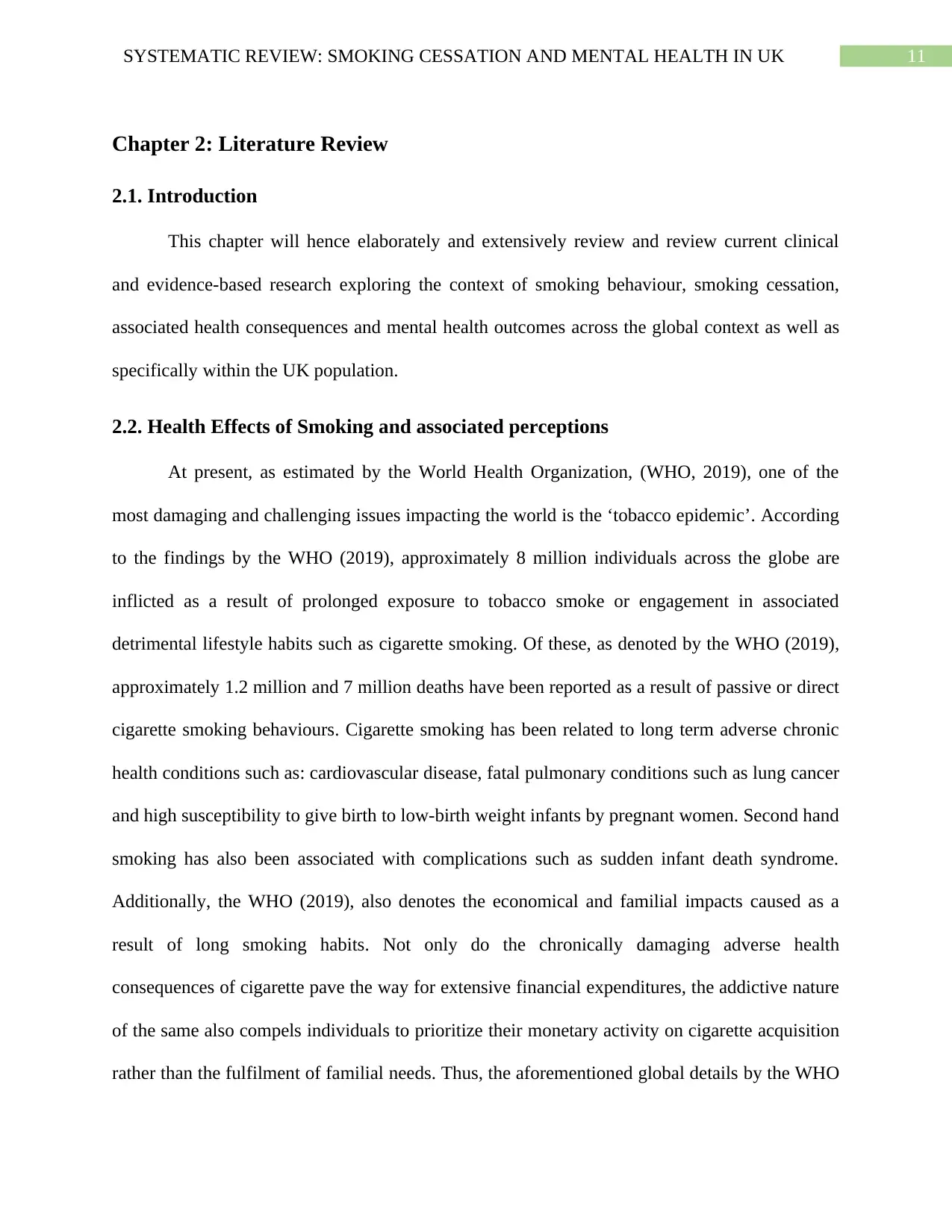
11SYSTEMATIC REVIEW: SMOKING CESSATION AND MENTAL HEALTH IN UK
Chapter 2: Literature Review
2.1. Introduction
This chapter will hence elaborately and extensively review and review current clinical
and evidence-based research exploring the context of smoking behaviour, smoking cessation,
associated health consequences and mental health outcomes across the global context as well as
specifically within the UK population.
2.2. Health Effects of Smoking and associated perceptions
At present, as estimated by the World Health Organization, (WHO, 2019), one of the
most damaging and challenging issues impacting the world is the ‘tobacco epidemic’. According
to the findings by the WHO (2019), approximately 8 million individuals across the globe are
inflicted as a result of prolonged exposure to tobacco smoke or engagement in associated
detrimental lifestyle habits such as cigarette smoking. Of these, as denoted by the WHO (2019),
approximately 1.2 million and 7 million deaths have been reported as a result of passive or direct
cigarette smoking behaviours. Cigarette smoking has been related to long term adverse chronic
health conditions such as: cardiovascular disease, fatal pulmonary conditions such as lung cancer
and high susceptibility to give birth to low-birth weight infants by pregnant women. Second hand
smoking has also been associated with complications such as sudden infant death syndrome.
Additionally, the WHO (2019), also denotes the economical and familial impacts caused as a
result of long smoking habits. Not only do the chronically damaging adverse health
consequences of cigarette pave the way for extensive financial expenditures, the addictive nature
of the same also compels individuals to prioritize their monetary activity on cigarette acquisition
rather than the fulfilment of familial needs. Thus, the aforementioned global details by the WHO
Chapter 2: Literature Review
2.1. Introduction
This chapter will hence elaborately and extensively review and review current clinical
and evidence-based research exploring the context of smoking behaviour, smoking cessation,
associated health consequences and mental health outcomes across the global context as well as
specifically within the UK population.
2.2. Health Effects of Smoking and associated perceptions
At present, as estimated by the World Health Organization, (WHO, 2019), one of the
most damaging and challenging issues impacting the world is the ‘tobacco epidemic’. According
to the findings by the WHO (2019), approximately 8 million individuals across the globe are
inflicted as a result of prolonged exposure to tobacco smoke or engagement in associated
detrimental lifestyle habits such as cigarette smoking. Of these, as denoted by the WHO (2019),
approximately 1.2 million and 7 million deaths have been reported as a result of passive or direct
cigarette smoking behaviours. Cigarette smoking has been related to long term adverse chronic
health conditions such as: cardiovascular disease, fatal pulmonary conditions such as lung cancer
and high susceptibility to give birth to low-birth weight infants by pregnant women. Second hand
smoking has also been associated with complications such as sudden infant death syndrome.
Additionally, the WHO (2019), also denotes the economical and familial impacts caused as a
result of long smoking habits. Not only do the chronically damaging adverse health
consequences of cigarette pave the way for extensive financial expenditures, the addictive nature
of the same also compels individuals to prioritize their monetary activity on cigarette acquisition
rather than the fulfilment of familial needs. Thus, the aforementioned global details by the WHO
⊘ This is a preview!⊘
Do you want full access?
Subscribe today to unlock all pages.

Trusted by 1+ million students worldwide
1 out of 68
Related Documents
Your All-in-One AI-Powered Toolkit for Academic Success.
+13062052269
info@desklib.com
Available 24*7 on WhatsApp / Email
![[object Object]](/_next/static/media/star-bottom.7253800d.svg)
Unlock your academic potential
Copyright © 2020–2026 A2Z Services. All Rights Reserved. Developed and managed by ZUCOL.





